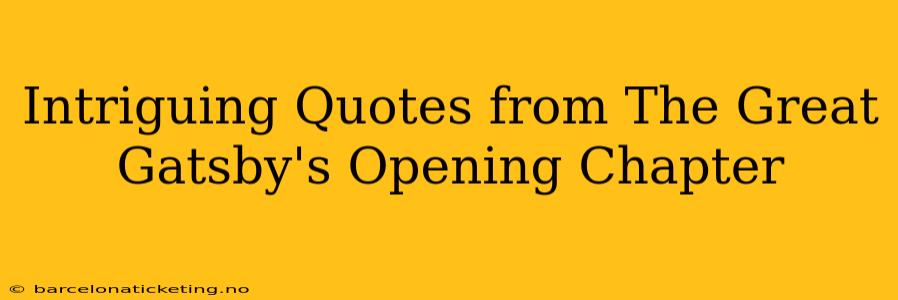F. Scott Fitzgerald's The Great Gatsby opens not with a bang, but with a carefully crafted, evocative scene setting the stage for the tragic romance and social commentary to follow. The opening chapter is brimming with intriguing quotes that subtly hint at the themes and tone of the novel. Let's delve into some of the most captivating phrases and explore their significance.
"Then wear the gold hat, if that will move her; / If you can bounce high, bounce for her, too, / Till she cry 'Lover, gold-hatted, high-bouncing lover, / I must have you!'"
This quote, a fragment of a poem by Thomas Parke D'Invilliers, immediately establishes a tone of yearning and almost desperate pursuit. It foreshadows Gatsby's relentless pursuit of Daisy Buchanan, highlighting the lengths to which he'll go to win her affection. The image of the "gold-hatted, high-bouncing lover" is both absurd and poignant, symbolizing the superficiality and extravagance of the Roaring Twenties while also revealing the depth of Gatsby's emotional investment. The poem's ironic tone hints at the unattainable nature of true love within the novel's context.
"I lived at West Egg, the – well, the less fashionable of the two,"
This seemingly simple sentence establishes a key element of the novel: the social hierarchy of Long Island. The narrator, Nick Carraway, subtly positions himself as an outsider looking in on the wealthy elite of West Egg and East Egg. This outsider perspective allows him to observe and comment on the excesses and moral ambiguities of the wealthy class, shaping the reader's understanding of the characters and their motivations. The understated nature of the line speaks volumes about the subtle class distinctions that drive the narrative.
"That's the best thing a girl can be in this world, a beautiful little fool."
Daisy Buchanan's infamous statement, uttered casually, reveals a profound cynicism about the role of women in society. It suggests that beauty and a lack of intellectual depth are valued more highly than intelligence and independence. This quote encapsulates the shallowness of the wealthy elite and their disregard for genuine emotional connection. It further underscores the tragic consequences of a society that values superficial appearances above substance.
What is the significance of the green light at the end of Daisy's dock?
The green light at the end of Daisy's dock is arguably the most famous symbol in the novel. It represents Gatsby's idealized vision of the past and his yearning for Daisy. It embodies his hope and dream, shining across the bay as a beacon of his unattainable desire. The green light's visual prominence and symbolic weight elevate it beyond a simple object, transforming it into a powerful representation of longing and the elusive nature of the American Dream.
How does the weather contribute to the mood of the opening chapter?
The weather in the opening chapter isn't explicitly described in great detail, but the overall sense of summer heat and the implied warmth contribute to a feeling of languid luxury and impending summer romance. This subtle use of weather foreshadows the intense emotions and potentially volatile relationships that will unfold throughout the story.
What is the role of the narrator in the opening chapter?
The narrator, Nick Carraway, serves as our entry point into the world of The Great Gatsby. He establishes the setting, introduces key characters, and subtly reveals his own biases and perspectives. His role is crucial in shaping our understanding of the events and characters throughout the novel, acting as both observer and participant in the unfolding drama.
What are the major themes introduced in the opening chapter?
The opening chapter masterfully introduces several key themes that underpin the entire novel: the allure and dangers of wealth, the complexities of class distinctions, the destructive nature of idealized memories, the elusive nature of the American Dream, and the superficiality of the Roaring Twenties. These themes are woven seamlessly into the narrative through carefully chosen language and imagery, laying the groundwork for a profound exploration of these complex issues.
By carefully examining these quotes and their context, we gain a deeper appreciation for Fitzgerald's masterful storytelling and the enduring power of The Great Gatsby. The opening chapter isn't just a beginning; it's a meticulously crafted overture that sets the stage for a tragic, beautiful, and unforgettable story.

